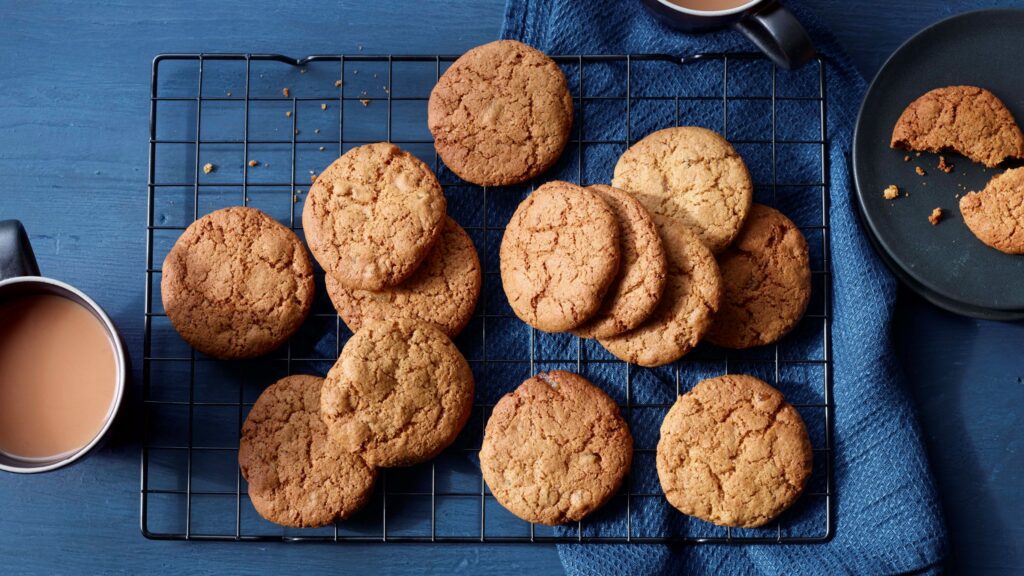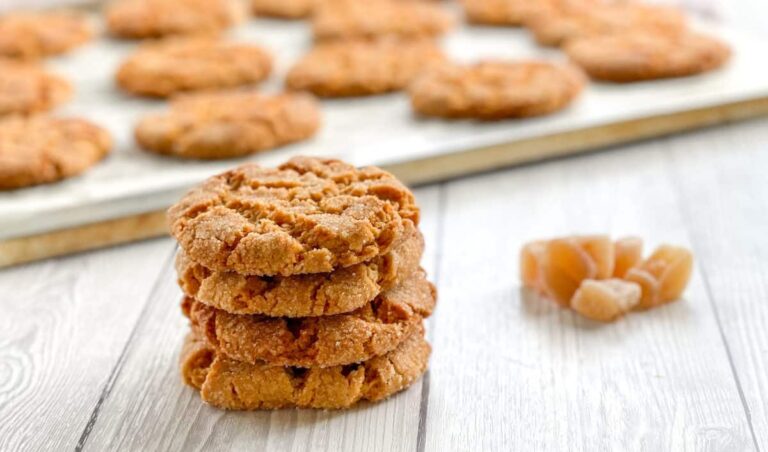Yes, ginger biscuits can be a tasty and somewhat nutritious treat when enjoyed in moderation. They often contain ginger, which has potential health benefits such as aiding digestion and providing anti-inflammatory properties.
However, it’s important to be mindful of their sugar and fat content. While the spices in ginger biscuits can offer some antioxidants, they should be considered as an occasional indulgence rather than a daily staple. If you’re a fan of ginger-flavored snacks, choosing homemade versions with less sugar or exploring healthier store-bought alternatives can enhance the nutritional value while still satisfying your taste buds.
What is the Nutritional Profile of Ginger Biscuits?

Ginger biscuits typically contain flour, sugar, butter or oil, and, of course, ginger. While they provide a tasty treat, it’s essential to be mindful of their sugar and fat content, enjoying them in moderation as part of a balanced diet.
Key Ingredients
- Flour: The primary base of ginger biscuits, providing carbohydrates for energy.
- Sugar: Adds sweetness but should be consumed in moderation due to its impact on blood sugar levels.
- Butter or Oil: Contributes to the texture and flavor, but also increases the fat content.
- Ginger: The star ingredient, not just for flavor but also for potential health benefits, including anti-inflammatory properties.
- Spices (Cinnamon, Nutmeg): Enhance flavor and may provide additional antioxidants.
Macronutrient Content (Carbs, Fats, Proteins)
Carbohydrates: The main energy source, primarily coming from flour and sugar. Moderation is key, especially for those watching their carbohydrate intake.
Fats: Found in butter or oil, contributing to the texture and taste. Going for healthier fat sources or reducing the amount can make ginger biscuits more nutritionally balanced.
Proteins: Generally low in ginger biscuits, with minimal protein content from ingredients like flour. These snacks are not a significant source of protein.
Micronutrients and Antioxidants
Ginger and Spices: Beyond flavor, ginger provides bioactive compounds with potential health benefits. Spices like cinnamon and nutmeg also contribute antioxidants.
Minerals: While present in small amounts, ginger biscuits may contain minerals like iron and magnesium from the flour and spices.
Fiber: The fiber content is generally low, but whole-grain flour or added ingredients like oats can increase the fiber content, aiding digestion.
What Are The Health Benefits of Ginger?

It helps with digestion, stops you from feeling sick, and might even help with joint pain and keep you healthy. Adding a bit of ginger to your food can make it tasty and good for your body.
Ginger’s Impact on Digestion
Gastrointestinal Relief: Ginger contains gingerol, a potent compound known for its anti-inflammatory and antioxidant properties. Ginger has a long history of use in traditional medicine for its ability to alleviate various gastrointestinal issues, including indigestion, bloating, and nausea.
Stimulates Saliva Production: Ginger’s ability to stimulate saliva production aids in the initial digestion process, breaking down food more effectively from the start.
Reduction of Nausea: Anti-Nausea Effects: Ginger is particularly effective in reducing nausea, making it a popular remedy for motion sickness, morning sickness during pregnancy, and post-surgery recovery.
Anti-Inflammatory Properties
Gingerol’s Anti-Inflammatory Action: Gingerol is recognized for its potent anti-inflammatory effects, which may help reduce inflammation and discomfort associated with various conditions.
Arthritis and Joint Pain: Studies suggest that ginger may provide relief from symptoms of osteoarthritis and rheumatoid arthritis, showcasing its potential as a natural anti-inflammatory remedy.
Muscle Soreness: Ginger consumption may aid in reducing muscle soreness and inflammation after strenuous physical activity, promoting quicker recovery.
Potential Immune System Support
Antioxidant Defense: Ginger’s antioxidant compounds help neutralize free radicals, supporting the body’s defense against oxidative stress.
Cold and Flu Prevention: Ginger’s warming nature may offer relief from cold and flu symptoms, potentially aiding in prevention and faster recovery.
Respiratory Health: Airway Clearance: The antimicrobial properties of ginger may help clear respiratory passages, providing relief from congestion and promoting overall respiratory health.
Immune-Boosting Nutrients: Ginger contains immune-supporting nutrients like vitamin C, magnesium, and zinc, contributing to overall immune system function.
How to Make Ginger Biscuits At Home?
Making ginger biscuits at home is a delightful and straightforward process. Here’s a simple recipe for homemade ginger biscuits
Ingredients
- 2 cups all-purpose flour (or whole wheat flour for added fiber)
- 1 teaspoon baking soda
- 1 1/2 teaspoons ground ginger
- 1 teaspoon ground cinnamon
- 1/4 teaspoon ground cloves
- 1/4 teaspoon salt
- 3/4 cup unsalted butter, softened
- 1 cup brown sugar, packed
- 1 large egg
- 1/4 cup molasses
- 1 teaspoon vanilla extract
Instructions
- Preheat the Oven: Preheat your oven to 350°F (175°C). Line baking sheets with parchment paper.
- Whisk Dry Ingredients: In a medium bowl, whisk together the flour, baking soda, ground ginger, cinnamon, cloves, and salt. Set aside.
- Cream Butter and Sugar: In a large mixing bowl, cream together the softened butter and brown sugar until light and fluffy.
- Add Wet Ingredients: Beat in the egg, followed by the molasses and vanilla extract. Mix until well combined.
- Incorporate Dry Ingredients: Gradually add the dry ingredients to the wet ingredients, mixing just until combined. Be careful not to overmix.
- Form Dough Balls: Scoop out portions of dough and roll them into small balls, about 1 inch in diameter. Place them on the prepared baking sheets, leaving space between each.
- Bake: Bake in the preheated oven for 10-12 minutes or until the edges are set. The centers may still be slightly soft, but they will firm up as they cool.
- Cool and Enjoy: Allow the ginger biscuits to cool on the baking sheets for a few minutes before transferring them to a wire rack to cool completely.
- Optional: Icing or Dusting (If Desired): Once cooled, you can optionally drizzle icing on top or dust the biscuits with powdered sugar for added sweetness.
FAQ
Are ginger cookies good for the stomach?
Yes, ginger cookies can be beneficial for the stomach. Ginger is known for its digestive properties and can help alleviate symptoms like nausea and indigestion.
Are ginger biscuits good for the skin?
Yes, ginger biscuits can contribute to skin health. Ginger has antioxidant properties that may help combat oxidative stress, potentially benefiting the skin.
Are ginger snacks healthy?
Yes, ginger snacks can be considered healthy in moderation. Ginger carries various health benefits, including anti-inflammatory and antioxidant properties, making it a positive addition to snacks.
Are ginger biscuits unhealthy?
No, ginger biscuits are not inherently unhealthy. However, moderation is key due to factors like sugar and fat content. Choosing healthier variations or homemade options can enhance their nutritional profile.
Do ginger biscuits contain real ginger?
It depends on the specific product. Some ginger biscuits may contain real ginger, while others might use artificial flavorings. Checking the ingredient list on the packaging can provide information about the presence of real ginger.
Is ginger tea effective for diarrhea?
Yes, ginger tea can be effective for alleviating symptoms of diarrhea. Ginger has anti-inflammatory properties that may help soothe the digestive system and reduce discomfort associated with diarrhea.
Final thoughts
To sum up, ginger biscuits can be a tasty treat, and while they offer some health benefits, it’s important to enjoy them in moderation. Consider pairing them with nutrient-rich snacks, be mindful of portion sizes, and make informed choices for a balanced diet.
Remember, balance is the key to savoring the goodness of ginger biscuits while promoting overall well-being.

